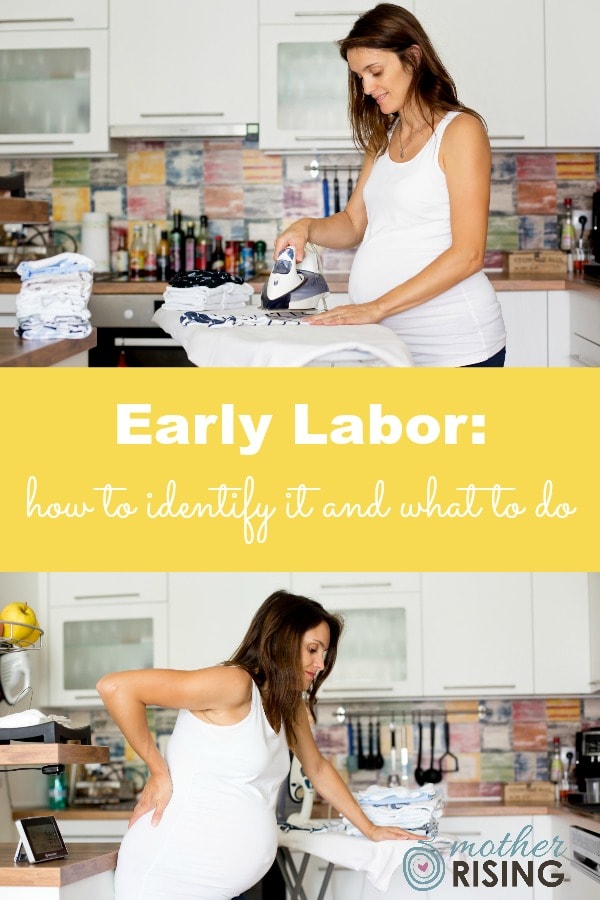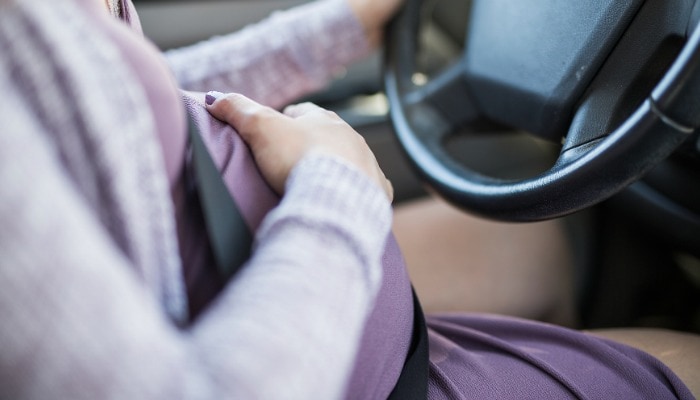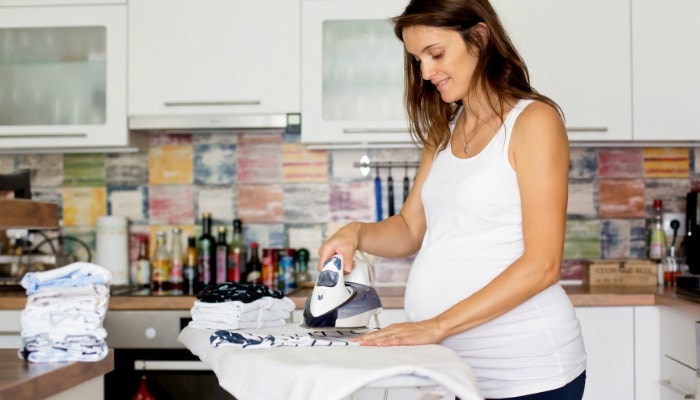Early labor is the beginning of the first stage of labor, the longest part of the birthing process. Early labor is a combination of end of pregnancy symptoms mixed with signs of labor, which sometimes makes things unclear if what’s happening is pre-labor or the real deal.
Use this guide to help identify signs of early labor, but also for ideas on how to cope and what to do. Let’s get started!
Early Labor: How to Identify It and What to Do
When learning about the first part of labor, it’s helpful to understand where it in the entire process. Below are descriptions of the three stages of labor, with early labor being at the beginning of the first stage.
Stage 1
Early Labor
Active Labor
Transition
Stage 2
Pushing and the Birth of the Baby
Stage 3
Delivery of the Placenta

What is Early Labor?
Early labor is the beginning of the first stage of labor, when contractions are short, around 30 seconds long, and somewhat irregular, around 5-7 (or even longer) minutes apart. At this point the cervix is dilated less than 6 cm. (SOURCE)
In early labor parents can walk and talk through their contractions. Oftentimes, onlookers have no idea what’s actually happening because these milder contractions can be masked by a woman determined to continue on with her daily life.
In the beginning of labor parents may notice that contractions
- don’t go away or space out after a glass of water or two, rest or shower.
- start feeling different than braxton hicks contractions. For example, in contractions at the beginning of labor may migrate to the back, whereas previously they were only in the front.
- get stronger, longer and closer together.
Signs of Early Labor
In early labor it is common for women to experience other signs of labor, besides just contractions.
Parents may notice
- Loose stools
- Bloody show or a mucus plug (Want to see what a mucus plug looks like?)
- Baby “dropping” or moving down lower in the pelvis accompanied by an increase in pelvic pressure
- Cervical dilation
- Water breaking
Simply because you have one or even two of the signs of labor above, doesn’t necessarily mean that you’re in labor. For example, say a woman has a vaginal exam at 39 weeks and finds out she’s 5 cm dilated. After the exam she notices a flurry of braxton hicks contractions.
Does it mean she’s in labor? Not necessarily. However, if she her contractions get progressively longer, stronger, and closer together, she could be in labor.
On the flip side, a woman could be in the beginnings of labor and not experience many of the signs of labor listed above. For example, a woman could be in early labor but not have loose stools, lose her mucus plug, or feel her water break.
FYI: A woman can be in early labor without her water breaking.

What Do Contractions Feel like in Early Labor?
Many parents want to know what early labor contractions feel like. By understanding how other women experience the beginning of labor it helps them figure out what’s going on with them too.
However, I will say that every woman is different and every birth is different. Check out this post about what contractions feel like in labor. You’ll notice that there is a wide range of answers!
In the beginning of labor, the average women experiences some pain and pressure in their back, the lower abdomen, and/or both. Some women compare early contractions like mild to moderate period cramps.
What did your contractions feel like at the beginning of labor? Leave a comment and share it with the Mother Rising community!

Is it Prodromal Labor or Early Labor?
Sometimes parents experience early labor contractions that don’t become longer, stronger, or closer together. This is not labor, but something called prodromal labor.
Prodromal labor is a variation of the early stage of labor. The difference between prodromal labor and early labor is that the contractions of early labor get longer, stronger and closer together but also dilate the cervix up to six centimeters.
Some women may never experience prodromal labor, but most will have some form of the early stage of labor.

How to Cope through Early Labor
Here are some practical and fun ways to cope through the beginning parts of labor.
- Carry on with your normal life. (A watched pot never boils.)
- Take a nap.
- Go for a hike or walk.
- Walk the mall or another air-conditioned facility if it’s too hot outside.
- Go for a swim. (Floating during pregnancy feels marvelous.)
- Hang out with family.
- Bake a cake for baby’s birthday.
- Finish working on the baby’s room.
- Start a baby book.
- Finish your pregnancy journal.
- Complete any thank you cards.
- Pack a hospital bag for birth.
- Set up the birth pool.
- Finalize any child or pet care plans for during labor.
- Stay hydrated.
- Eat freely and often.
- Grocery shop online.
- Watch a movie.
- Take a picture of your beautiful pregnant belly!
- Use this website at your discretion.

The following is a list of activities that are not helpful during early labor.
- Posting labor updates on social media. (The well-meaning texts, messages, and calls that will ensue can become stressful, especially if things take longer than anticipated.)
- Going to the hospital too early. (Unless medically indicated, the best place to be in the beginning of labor is at home.)
- Getting out of bed or waking your parter at 2 am. (Rest should be priority in early labor!)
The Best Advice Ever
If you do one activity on the list above, let it be “take a nap”, and be sure to rest between contractions.
Especially for first time moms, the pain of labor isn’t the only thing that’s challenging, it’s also exhaustion. Sure, labor pain encourages mothers to get an epidural, but it’s also exhaustion.
If you wake up in the middle of the night and notice early contractions PLEASE try and go back to sleep. If you can’t sleep, simply be still in your bed in the dark. Do not turn on any lights, but rest your body and mind. And make sure to not wake your partner! Let them sleep too. You both need your rest as you have a lot of work in front of you!

A Recap
To recap, the following are the phases of labor that a women will go through to give birth to her baby.
What comes next in the first stage of labor? Active labor! Head on over here to read all about active labor, when to go to the hospital, and how to cope.
Stage 1
Early Labor
Stage 2
Pushing and the Birth of the Baby
Stage 3
Leave a Comment
Leave a comment and share with the Mother Rising community about your experience of the beginning of labor. How did you know you were in labor? What did you do to cope? What memories of the beginning of labor most stand out to you?
Thank you! I can’t wait to hear your story.

Sawsan
Monday 20th of November 2017
My name is Sawsan. I am pregnant My due date is 02.15.2018 i was C section my first baby after 14 month i am pregnant again Can i be good candidate for VBAC? And how long i can stay at home laboring. I don't want to go hospital early. My first baby 39 weeks my doctor induced me and broke my water after they did epidural Reason of my C-section was fetal heart rate was come down and i was dilated 9,5 CM. I want to ask how i know labor pain or uterus rupture is it a safe for me to be at home in early labor stage?
Lindsey
Monday 27th of November 2017
I would consult with your care provider on this one. Best of luck!:)
L.J.
Saturday 15th of July 2017
Hello! First, great suggestions! These sounds very similar to what I'm hearing from my natural birthing classes. :) I do have a question that I'm quite confused about. I'm about 32 weeks along in my first pregnancy and am having a lot of Braxton hicks contractions. Last night, I had around ten in one hour, but they weren't at regular intervals, nor were they all of the same intensity or duration. What is normal when it comes to Braxton hicks before full term?
I've also gotten mixed messages from different sources about when to be worried and contact my provider. My internet searches seem to agree that if someone has four or more in an hour, that it's time to contact her provider. My past provider (an OB) told me not to contact her unless the contractions become painful. My current provider (a midwife) told me to drink a quart of water, take a bath, and rest to see if they go away, and if not, to contact her.
When should I be worried? I don't want to cry wolf and be a paranoid first time momma, but I do want to err on the side of caution.
Leah
Wednesday 15th of May 2019
My Midwives are telling me that when the contractions are 5 minutes apart, 1 minute long and last for 1 hour at that rate (5-1-1), then call them. Of course, they also know that my goal is not to arrive at the hospital (25 minutes away) before 6-8 cm of dilation since I want an all natural birth.
Lindsey Morrow
Saturday 15th of July 2017
Your care providers are your paid consultants so it is absolutely OK to ask them these questions. It's why you hired them! I would direct this question to your current care provider and follow her suggestions. It sounds like great advice.
Valerie
Sunday 11th of December 2016
I am pregnant with my third child and with my first I was a week over my due date and my doctor induced me. I had pain medication and epidural and don't remember much. With my second I was also induced because I was scared of knowing what labor with out pain medication was like. I had hot spots and felt a lot of pain during the birth of my daughter And I am the type I don't take pain medication ever unless I get a headache and may take one ibuprofen. Anyways I am now 24 weeks pregnant with my third and I am seriously thinking about natural birth. No pain medication and no epidural. I may chicken out but I want to try. Any tips on mentally preparing myself for natural childbirth
HW
Thursday 19th of January 2017
I thought the book Birthing from Within helped me a lot to prepare mentally and emotionally for natural birth. Also, it is during transition that moms typically think they can't do it...but know you are in transition, you CAN do it, and it doesn't really get worse from there, and some moms find pushing easier. Transition is hard, but alao goes much faster than early or active labor. I thought practicing completely relaxing my body throughout pregnancy really help2d me cope with transitions. When things got hard, it really helped to have my husband talk to me so I could focus on his words instead of my negative thoughts. I hope that helps some!
Molly
Saturday 13th of August 2016
Hi I'm 36 weeks pregnant and a few nights ago (putting me at 35/and 5) I had contractions for 10 hours straight! Yes 10 lol I went to the hospital and while there I dilated 1cm going from a 2 to a 3 in an hour. Over the next hour I didn't change so they sent me home, but my contractions were getting more painful then when I arrived. I haven't had a contraction since. The same thing happened 2 weeks ago only I contracted for 5 hours and and did not change at all so was sent home. I was told the other night that im in early labor but I'm very confused. They didn't keep me also because I'm still preterm. My question is if I'm in early labor why do contractions stop for days then return? Also I'm now gun shy to go back to the hospital lol so how do I know when its really time to go. I don't wanna wait to long lol My first childs pregnancy, labor was so different compared to this and has me all confused as you said ;)
I would love if you had any helpful thoughts and or suggestions! Thank you!
Lindsey Morrow
Saturday 13th of August 2016
Yes, definitely sounds like early labor. I'm so sorry you're one of those that has to experience a long dragged out early labor! Probably for the best since you're so early though. WARNING: I've had many doula clients and/or childbirth class students experience this and come time for active labor it went very, very fast. Stay hydrated, don't over do it, put your feet up and rest.